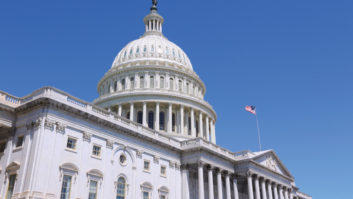Update to the story below: This legislation subsequently passed a House subcommittee on May 23; read our coverage.
The wheels are turning in Washington, D.C., to bring the AM Radio for Every Vehicle Act closer to a vote in Congress.
A new amended version of the bill, introduced this week in the U.S. House by Rep. Frank Pallone (D-N.J.), mirrors the language in the bill passed out of the Senate Commerce Committee last year. The changes provide a timetable for car manufacturers to comply with the new regulations if they ever become law.
If passed, the updated bill would require the Department of Transportation to adopt a rule within 12 months to require that automakers provide access to AM broadcast stations in their motor vehicles. The bill would mandate car manufacturers to install devices capable of receiving AM radio signals in all new passenger vehicles sold in the United States at no additional cost to consumers.
At present, the AM Radio for Every Vehicle Act of 2024 (S.1669/H.R. 3413) has 61 cosponsors in the Senate and 252 cosponsors in the House of Representatives.
The National Association of Broadcasters applauded the markup. “This builds on the momentum led by the original cosponsors of the AM Radio for Every Vehicle Act,” NAB President/CEO Curtis LeGeyt said in a statement.
The NAB and radio broadcasters have argued that traditional AM radio in motor vehicles plays a critical role in America’s public safety infrastructure.
According to those familiar with developments, a vote to advance the new version of the bill by the Innovation, Data and Commerce Subcommittee is expected on Thursday.
Carmakers would have to abide by the new rules within two to three years, as determined by DOT, or face a civil penalty. Smaller vehicle manufacturers would have up to four years to comply with the mandate. Any car manufacturers that do not include AM in their vehicles prior to the rule’s adoption would be required to put a warning label on vehicles.
[Related: “AM Radio Bill Bolstered in House Despite Warring Testimonies“]
Opponents of the legislation include an alliance of organizations advocating for the American Music Fairness Act, which, if enacted, would require radio broadcasters to pay performance royalties to artists when their songs are played over the air.
In an email this week from Precision Strategies — a strategy and marketing agency and representative of the alliance — the group specifically targeted iHeartMedia.
The supporters of the American Music Fairness Act (H.R. 4130) say it is “an injustice that the AM Radio in Every Vehicle Act is being fast-tracked even as iHeart, which owns more than 850 radio stations in 160 markets, refuses to pay music artists performance royalties when their songs are played on the air.”
The statement continued: “The U.S. is the only democracy that doesn’t pay artists when their music is played on AM/FM radio. North Korea and Iran also deny AM/FM royalties to artists. That means the U.S. is part of an ‘Axis of Injustice’ that denies artists payment for their work,” according to the statement.
The music alliance believes that 240 million songs are played on AM radio each year.
“AM/FM radio has refused to pay royalties to performers for more than a century, while Big Radio giants — like iHeart — made $15 billion in revenues in 2023,” according to the statement sent to Radio World.
iHeart has spent $50 million in lobbying on its priorities since 2003, according to a recent statement from the alliance.
The group also cites a potential conflict of interest. “(iHeart) has also given Sen. Ted Cruz’s Super PAC $630,000 in campaign donations — no surprise considering the senator hosts a podcast that helps iHeart generate ad revenue and is himself leading the AM Radio in Every Vehicle Act in the Senate.”
Radio World has reached out to iHeartMedia for comment and will report any response.







